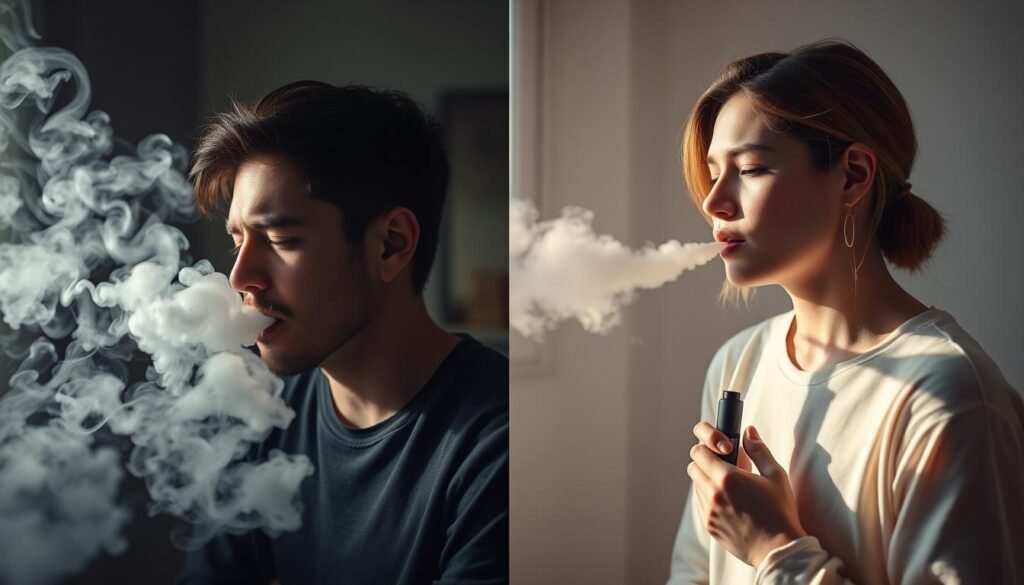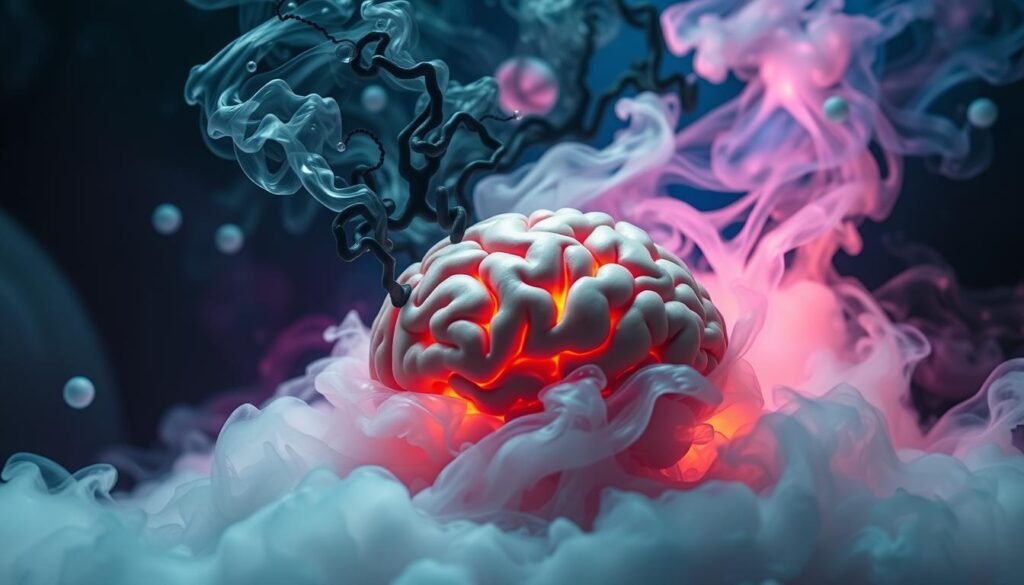Did you know around 60% of people who vape, no matter if it’s just nicotine, just THC, or both, say they feel anxious? This fact shines a light on how vaping might affect our minds, especially in young people. As vaping becomes more popular, we’re seeing more mental health issues. People are starting to ask if vaping might be causing anxiety problems.
It’s important to understand how vaping and anxiety are connected. Research from the American Heart Association shows that people who vape nicotine or THC tend to feel more anxious than those who don’t. With 70% of THC-vapers and 60% of nicotine-vapers reporting anxiety, we need to look into how vaping affects mental health.
This article will explore the link between vaping, our mental state, and the chance of a mental health crisis among young users. We’re going to find out what the science says about vaping and anxiety. Stay with us to learn about the science behind vaping and its effects on anxiety.
Key Takeaways
- About 60% of vapers report experiencing anxiety symptoms, significantly higher than non-vapers.
- From vaping demographics, the connection between THC and increased anxiety is particularly notable.
- Over half of nicotine-only and THC-only vapers reported depression symptoms.
- Many vapers initially turned to vaping to cope with stress and anxiety.
- Future research is needed to explore the long-term mental health effects of vaping.
- Vaping is increasingly common among high school students, with significant usage rates reported.
Understanding Vaping and Its Popularity
Vaping has changed how people use nicotine. E-cigarettes are now a top choice for many. This shift is especially big among teens and young adults. The 2019 National Youth Tobacco Survey found over 5 million middle and high school students using e-cigarettes. Vaping popularity among young people is clearly on the rise.
Flavored e-cigarettes are a big hit, with 8 out of 10 users choosing them. Menthol flavors are especially popular. The CDC says vaping is the most common nicotine use among American youth. It’s important to understand why they are attractive. Support from the community can help in dealing with anxiety and making healthier choices. Helpful insights and methods can be found here.
Efforts to control vaping, like banning flavors and raising the purchase age, are ongoing. Still, vaping numbers grow. Studies show that vaping teens may face more mental health issues, like anxiety and depression. The relationship between vaping, social pressures, and anxiety need more study. Knowing its long-term effects is crucial.
The Psychological Effects of Vaping
The rise of vaping among young people is worrying due to its psychological effects of vaping. Even occasional use can lead to anxiety and mental health problems. Studies show that nicotine found in many vape products can make anxiety worse. Users might feel vaping anxiety symptoms like panic attacks and mood swings, more so with regular use. This is troubling because many young people vape to cope with stress, which might worsen existing mental issues.
Using e-cigarettes often can lead to addiction and mental health problems. For example, nicotine can change mood, energy, and lead to depression. These mental health implications of vaping can start a cycle of more anxiety and vaping. This cycle makes quitting hard, trapping users in dependence.
Research indicates that stopping vaping could improve mental health. Many say they feel less anxious and happier after they quit. We need to make understanding the psychological effects of vaping a priority. This knowledge should be part of efforts to teach young people about vaping’s risks.

Does Vaping Cause Anxiety? Insights from Recent Studies
Recent studies show a link between vaping and higher anxiety levels. Nicotine and THC vapers are especially at risk. Surveys with young people show vaping is common, raising questions about mental health.
Evidence Linking Vaping and Anxiety Symptoms
People aged 13-24 who vape report more anxiety than those who don’t. A study with 2,505 teens found 70% of THC vapers and 60% of nicotine vapers felt anxious. These numbers show vaping could increase anxiety risk by 50-75%. Research supports vaping’s link to anxiety, suggesting effects on mental health.
Statistical Overview of Vaping Among Youth
Teen vaping is on the rise, with a 1,800% annual increase. Now, 1 in 20 Americans vape. Almost all e-cigarettes in the U.S. have nicotine, which may worsen anxiety. The growing trend of vaping among the young worries experts about its long-term mental health impacts.

| Age Group | THC-Only Vapers Reporting Anxiety | Nicotine-Only Vapers Reporting Anxiety |
|---|---|---|
| 13-24 | 70% | 60% |
| 15-18 | Higher propensity | Increased symptoms |
| All Youth Vapers | 50-75% increase vs. non-vapers | — |
The rise in vaping among teens prompts a deeper look into how it affects their anxiety and mental health. It’s vital to keep studying this trend to tackle this public health issue.
Vape Components Linked to Anxiety
The popularity of vaping is increasing, and so are concerns about its mental health risks. Nicotine, found in many e-cigarettes, is linked to anxiety disorders. Research highlights a clear link between nicotine and anxiety, pointing out the mental health challenges in users. This showcases the complex relationship between vaping and anxiety.
Nicotine and Its Impact on Mental Health
Nicotine addiction and mental health problems often go hand in hand, trapping users in a difficult cycle. About 60% of people who vape just nicotine feel anxious, while around 40% of people who don’t vape do not report these feelings. This shows that vaping can make anxiety worse or even cause new symptoms.
Moreover, over half of those vaping nicotine feel depressed, showing big challenges with mental health. The craving for nicotine can increase anxiety when trying to quit. This makes the situation even more challenging.
Other Ingredients in E-Cigarettes that May Affect Mood
It’s not just nicotine. Other things in e-cigarettes can change mood and mental health. This helps us understand how vaping chemicals relate to anxiety. Flavors and additives in e-cigarettes might make anxiety and depression worse. Studies have found that people who vape are more likely to feel psychologically unwell.
For example, people who vape both nicotine and THC are more likely to feel anxious and have suicidal thoughts compared to those who don’t vape.
| Vaping Group | Reported Anxiety Symptoms | Reported Depression Symptoms | Suicidal Thoughts |
|---|---|---|---|
| Nicotine-only Vapers | 60% | Over 50% | Over 50% |
| THC-only Vapers | 70% | Nearly 50% | Over 50% |
| Dual Vapers (Nicotine & THC) | 60% | Over 50% | Over 50% |
| Non-Vapers | 40% | 25% | About 33% |
The link between vape ingredients and mental health is important. As nicotine and other components affect users’ experiences, teaching about their impact on anxiety is key.

Vaping and Anxiety Disorders
The connection between vaping and anxiety disorders is getting more focus, especially vaping and panic attacks. Studies show vaping may increase the risk for panic attacks, a key sign of panic disorder. It’s alarming that users often feel more anxious or panicked after vaping.
Exploring the Connection Between Vaping and Panic Attacks
Nicotine-based vapes seem to cause more anxiety. A study found 81% of young adults vape to reduce stress and anxiety. Yet, this coping method may worsen symptoms. The nicotine in vapes can spike anxiety levels, trapping users in a tough cycle.
The Role of THC in Anxiety and Depression
THC in vapes adds to mental health concerns. Users of THC vapes report more anxiety and depression. Some vape THC hoping to feel better, but it might make anxiety disorders worse. Frequently using THC can harm lungs and mental health, showing a complex link between THC, vaping, and well-being.
Research links vaping among young adults to mental health issues. Studies mention that vaping users are likelier to have anxiety. They are also twice as prone to depression. This information calls for closer looks at how vaping might affect mental health.
The findings highlight the need to understand vaping’s effects on young people. For detailed info on the link between depression, anxiety, and vaping, check this study.
The Vaping and Mental Health Epidemic Among Youth
Vaping is a big public health issue, especially for young people. Teens and young adults between 15 to 24 are vaping more than ever. This trend is worrying because vaping is linked to more anxiety, depression, and other mental health problems.
Demographics of Vaping in Adolescents
More teens are vaping, while fewer are using tobacco. Even middle schoolers are starting to vape. This is alarming. A survey by the American Heart Association showed over 50% of vapers felt depressed in one week. Only 25% of non-vapers felt this way.
Also, 60% of vapers felt anxious, while only 40% of non-vapers did. This shows how vaping can affect mental health in young people.
Parental and Community Concerns Around Youth Vaping
Parents are increasingly worried about vaping. They are concerned about how normal it has become and its effects on mental health. Furthermore, more than half of the young vapers have thought about suicide. This is much higher than non-vapers.
Many youths vape to deal with stress or anxiety. Four out of five young vapers are doing it for this reason. This issue makes people wonder about how to better support young people’s mental health.
| Symptom | Vapers (%) | Non-Vapers (%) |
|---|---|---|
| Depression Symptoms | 50 | 25 |
| Anxiety Symptoms | 60 | 40 |
| Suicidal Ideation | >50 | |
| Dependent on Nicotine | 3-4x risk of major depression | N/A |
| ADHD Symptoms | Twice as likely | N/A |
Withdrawal Symptoms and Vaping
Quitting vaping can be hard due to many withdrawal symptoms. Anxiety is a big challenge when stopping. Knowing about these symptoms is key for anyone wanting to quit nicotine. Nicotine withdrawal can make it harder to deal with anxiety disorders.
Understanding Nicotine Withdrawal and Anxiety
Stopping vaping leads to different nicotine withdrawal symptoms. These can be anxiety, irritability, and restlessness. The first week is usually the hardest. Anxiety gets really bad in the first three days.
- Anxiety and heightened stress
- Irritability and mood swings
- Difficulty concentrating
- Insomnia or disrupted sleep
- Increased appetite and potential weight gain
Handling vaping withdrawal effects well is important. Not managing anxiety can make it worse. Drink lots of water, get enough sleep, eat healthy, and look for support. Doing relaxation exercises like deep breathing can help too.
Long-term Effects of Vaping on Mental Health Recovery
Long-term vaping affects mental health recovery. Studies show that ex-vapers usually feel better mentally than those who keep vaping. Getting better without nicotine helps a lot because nicotine use can stop you from dealing with anxiety and other issues.
Knowing what makes you want to vape, like certain places or feelings, is helpful. Also, drinking less caffeine can reduce stress and anxiety. Making a detailed plan to quit with help from others can make recovery smoother.
| Withdrawal Symptom | Duration |
|---|---|
| Anxiety | Peaks within 3 days, may last several weeks |
| Insomnia | Common in the first month |
| Cravings | Can occur long after quitting, especially in the first few weeks |
| Increased Appetite | Common in the first month |
Learning about chronic vaping and mental health helps people focus on recovery. It encourages starting a nicotine-free life.
Examining Vaping as an Anxiety Trigger
Vaping is often talked about in anxiety management, especially among young people. Many start vaping thinking it will help reduce stress and anxiety symptoms. In fact, research shows that about 81% of young people who use e-cigarettes started to lessen stress, anxiety, or depression. Yet, this habit can lead to a cycle. The cycle starts with temporary relief from vaping but ends with increased anxiety over time.
How Vaping Perpetuates Anxiety Cycles
Using vapes can make anxiety levels rise, especially when withdrawal kicks in. A lot of vapers, about 50.3%, vape to deal with stress or anxiety. This habit can worsen mental health and increase anxiety triggers from vaping. Users might get stuck in a cycle, using vaping as a false solution, which only raises their stress and anxiety levels further.
Vaping as a Coping Mechanism for Mental Health Issues
Some people view vaping as self-medication, a way to ease mental health challenges. But this view can backfire, making issues worse instead of better. For example, stopping vaping has been linked to lower stress and anxiety levels, according to studies. Shifting towards better anxiety management methods—like deep breathing, staying active, and eating well—could offer lasting solutions. Incorporating a variety of strategies can greatly improve emotional health and help handle anxiety better. For more on handling anxiety well, check out stress management techniques.